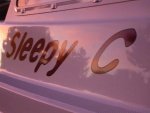Larry Q
New member
- Joined
- Mar 17, 2006
- Messages
- 231
- Reaction score
- 0
- C Dory Year
- 2006
- C Dory Model
- 22 Cruiser
- Vessel Name
- C-ya
I worked for a division of Campbell Soup for ten years in the DomSea division. We raised Coho salmon and some Kings in the early years.
We had two large fresh water sites in Rochester Washington and three net pen sites in Puget Sound.
My job was to build and maintain the freshwater sites. Our hatcheries were capable of holding around twenty million eggs.
After the second generation of fish we had our own brood stock that we took the eggs from.
Our smolts were transferred from from fresh water to salt water when they reached about 100 grams in size. We photo adjusted the fish by raising them in a light controlled environment so they would smolt when we needed so we could ship fish year round, not just around the summer solstice.
In the 1980's all fish farms used single pass water that we sent through three settling ponds. Now the farms recycle 90 percent or more of their water.
Our net pens were located between Bainbridge Island and Manchester in Puget sound, this is a high current area. I dove many times to rest cables and anchors on these pens. It was cleaner under these pens than under any city dock on the sound.
The feed was made to our speck using crab and cray fish shells to get the "natural" color.
Correctly done there is nothing wrong with fish farming. Over crowding and poor location along with greed are the real culprits.
I left the industry when Campbell soup sold out to a Norwegian company
Global Aqua in 1989. I still know several people in the industry.
Campbell soup was a great company to work for and were VERY environmentally conscious.
We had two large fresh water sites in Rochester Washington and three net pen sites in Puget Sound.
My job was to build and maintain the freshwater sites. Our hatcheries were capable of holding around twenty million eggs.
After the second generation of fish we had our own brood stock that we took the eggs from.
Our smolts were transferred from from fresh water to salt water when they reached about 100 grams in size. We photo adjusted the fish by raising them in a light controlled environment so they would smolt when we needed so we could ship fish year round, not just around the summer solstice.
In the 1980's all fish farms used single pass water that we sent through three settling ponds. Now the farms recycle 90 percent or more of their water.
Our net pens were located between Bainbridge Island and Manchester in Puget sound, this is a high current area. I dove many times to rest cables and anchors on these pens. It was cleaner under these pens than under any city dock on the sound.
The feed was made to our speck using crab and cray fish shells to get the "natural" color.
Correctly done there is nothing wrong with fish farming. Over crowding and poor location along with greed are the real culprits.
I left the industry when Campbell soup sold out to a Norwegian company
Global Aqua in 1989. I still know several people in the industry.
Campbell soup was a great company to work for and were VERY environmentally conscious.

